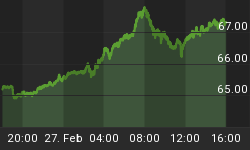Our previous look at the oil market last month alluded to the parabolic dome-shaped structure in the oil futures chart, which suggested the near-term topping process that was underway. I wrote, "This should present a welcome relief from the runaway energy prices we've endured since last year and will give the financial markets some much-needed breathing room as we enter the second quarter after a not-so-hot first quarter."
One of the dominant themes this year has been the significant slowdown in the MZM money supply growth and the possibility for an economic slowdown by later this year. How would this affect oil prices? A decrease in liquidity would put a damper on the demand for oil, especially once this slowdown hits the much bigger global economy. As one well-known economic expert, Ed Yardeni, has recently stated, the sharp drop in the growth of global liquidity since last summer suggests that oil demand growth should slow soon as well. As Yardeni has pointed out, "The growth in Foreign Official Dollar Reserves (FRODOR) is a....12-month leading indicator of the growth in world crude oil demand....The 52-week growth rate of FRODOR is down to 15.8% during the week of March 29 from the latest cyclical peak of 36.2% during the week of August 18, 2004. The slowing in global liquidity suggests that global demand growth should peak soon, and so should the price of oil."

While there is much to be said about a "contained" oil price in 2005, there are some who take the extreme view that oil will plummet to considerable depths. Closer to this deflationist side of the oil argument is Steve Forbes, editor-in-chief of Forbes Magazine. In a recent editorial entitled "The Oil Bubble" he predicts the imminent demise of the oil bull market, predicting oil at $30 to $35 a barrel by early 2006.
Forbes blames the petroleum price surge on the Federal Reserve's "inadvertent inflationary monetary policy" that began in 2003. "Inflation begets speculation," writes Forbes. "There's hardly a hedge fund in the country that hasn't taken fliers on petroleum futures. Inventories, already very high, are surging in anticipation that oil is headed even higher. Goldman Sachs' prediction that oil could go as high as $105 a barrel is a sure sign that prices are peaking." He points out that such talk hasn't been common since the early 1980s shortly before oil prices went into a long-term deflationary decline.
Approaching the oil inflation argument from inflationist point of view is columnist Jim Jubak. In a recent editorial about crude oil's prospects for 2005 he asserts, "Is $60-a-barrel oil in our future? In our near future? Yep. It's a sure thing."
Jubak maintains that once the oil market has overcome the psychological $60 barrier, we can all expect oil prices to run higher before pausing again. So who's to blame for the oil price inflation Jubak expects? "You can thank Vladimir Putin and those apparatchiks who run Russia's economy for the run-up," he says. "They've just about guaranteed that Russia's oil industry won't get the foreign capital it needs to expand the number of barrels the country pumps annually."
Jubak points out that is bad news for heavy oil consumers ranging from airlines to commuters, since Russia accounted for about 75% of growth in oil production from non-OPEC (Organization of Petroleum Exporting Countries) sources in 2004, according to Jubak. Russian production growth peaked at a 12% annual rate in the middle of 2003, he says, before easing to 8% growth year-over-year in 2004, and then plunging to just a 4.6% annual growth rate in the first quarter of 2005. He cites the State Committee of the Russian Federation figures showing crude oil output climbed even more slowly as of first quarter 2005, by just 4.3% year-to-year. "Official projections call for 5.7% growth in 2005, well above the first quarter's rate but way below the 8% average annual growth from 2000-2003," he writes.
Taking the inflationist view of oil even further to the extreme is the recent Goldman Sachs prediction for $105/barrel oil in the near future. So who's right? The extreme deflationists (Prechter, Forbes, et al) or the hyper-inflationists?
What about Mr. In-between? Doesn't he have a tendency to show up whenever the extremes on either side of the argument tend to balance out? Oil below $35 isn't very likely, but neither is $105 oil. The money supply rate of change (ROC) slowdown will most likely keep the oil price contained in a range (there's that "Year of the Trading Range" theme once again) that will prevent the hyper-inflation argument from coming to fruition. But global demand will keep hyper-deflationary oil prices from being realized as well.















